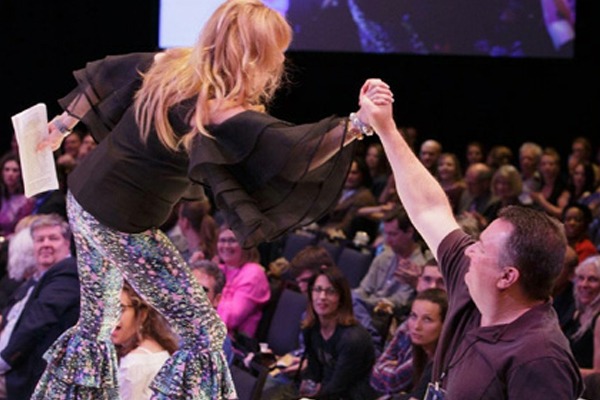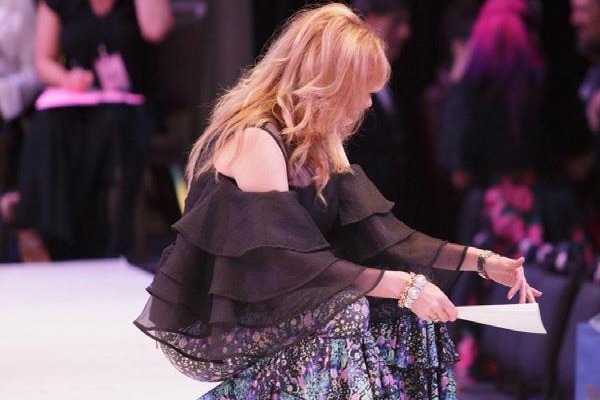
Most people die out on their passions because they are afraid to take risks or they do not want to hear what other people will say. But failing is part of our humanity, as well as our flaws and mistakes, making us imperfectly perfect beings. Ben Baker talks with Shelly St. John, dubbed as The Auction Diva, about the importance of being true to yourself and how to gather confidence in doing what you truly love, all while upholding your values and goals. Shelly explains why we must focus on the people who appreciate us instead of going for public fame and how embracing our passion can influence others in finding their own paths.
—
Listen to the podcast here:
Being Imperfectly Perfect With Shelly St. John
It is amazing to read the different conversations that happened in and around my show, and the people will sit there and go, “Can we talk about this different topic?” The topic that keeps coming up is the reason why I brought my guest onboard. It’s because she said it better than anybody else. It comes around this as the imperfect perfect and we’re going to get into this. My guest is The Auction Diva, Shelly St. John.
—
Shelly, welcome to the show.
Thank you, Ben. It is always a pleasure speaking with you, listening to your experiences, what you have learned over your lifetime, what you share with your clients, and the gifts that you’re sharing with the world.
That’s what I love about this show. This show is truly a conversation. From the minute I started, I don’t always know exactly where it’s going to go. You’ll never know where a conversation is going to head. We start off with the best intentions. We have some basic ideas of what we’re going to talk about, but I love those little rabbit holes that come up every once in a while where you say let’s explore that because that’s where the magic happens.
It’s the improv in a podcast on a business stage instead of on a comedy stage. It’s the connection that people link. It’s the thoughts that one has, another has, and how amazingly symbiotic many of those thoughts and processes are.
You’re a TEDx speaker, an auctioneer, and you do all these things. Give my audience a little bit of a background about who is Shelly St. John and then let’s get into the imperfect perfect because this is a great conversation for us to get into.

I am a simple Minnesota girl. Born and raised in the small town of Minnesota. I had an interesting twenties growing up. I even got stood up for my high school prom. I was this little ugly duckling. They say that, “You get better as you get older.” I’m holding onto that. When I was a sophomore in high school, my mother thought, “I’ve got to help Shelly to do something so that we can build her confidence and her strength.” My mother sent me to a modeling, finishing, and interior design school in Minneapolis and it changed my life. From the first photoshoot and the first ads, I did the print ads, the runway, and experiences that I had doing fashion and furs. It took me to some interesting places. One of those places was the Playboy Bunny Club in Lake Geneva, Wisconsin. I was a cocktail waitress.
The stories that come out of that have got to be phenomenal.
The people that I got to meet and things that I got to do. I got to ride on Leona Helmsley’s private plane. Who can say that? It was amazing growing up. Around 24 or 25, we as a family decided that it was time for me to stop gallivanting across the world and come back to civilization in Minnesota. I went back to school, joined the corporate world, and that led me to be transferred with my hotel company to Arizona. I met the man that I was going to marry. I had a fifteen-year marriage, moved all over the country, and I landed here in Denver. I owned a marketing company called Primary Objective for 21 years between Michigan, Texas, and Colorado. For years, I have been a fundraising auctioneer raising money for schools, nonprofits, and religious organizations across the country. That is a little snapshot.
I always wonder how people get into the auctioneering business. It’s like becoming a radio star. You don’t grow up thinking you’re going to become a radio star or most people don’t. How did you get into the auction business? It’s a completely different world than what most people are used to seeing or most people are used to thinking about. How did you get into it and why the passion for auctioneering?
The auctioneers I know across the country, a good 50% of those have some auctioneer background in their family. I’d say 25% to 30% of the auctioneers I know are 2nd, 3rd, or 4th generation auctioneers. I grew up in a small town in Minnesota, going to antique auctions with my mother where we would find beautiful antiques and refinish them. That was my mom’s passion. Never for a moment did I ever think, “I want to be an auctioneer.” It never crossed my mind. I had a life change in 2005. I had my marketing company going strong and I had a first-floor storefront office in LoDo which is a great part of Downtown Denver. I was watching buildings go up and I thought, “I want to get into this real estate game.” I had commercial real estate clients in marketing, residential real estate, investment real estate so I couldn’t get into real estate to compete with any of my amazing marketing clients.
Failure is a required catalyst in embracing successes. Share on XI let it go and that thought passed. One Saturday, I was at home. I turned on the television and flipping channels. I landed on a Discovery Channel segment about a husband and wife real estate team that had decided to go to auction school to learn how to sell real estate at auction. I’m standing there in my living room and I’m looking at this. There wasn’t even a millisecond delay in my mind and I blurted out, “I could do that. Why couldn’t I do that?” I finished watching the segment. I went into my home office, got under the computer, looked at auction real estate and said, “This is the fastest-growing method of transacting real estate in the country. I need to explore this.”
Keep in mind, this was 2006. We had a big real estate recession and turned down beginning in late 2007, early 2008. I decided in 2006 that I was going to do this. I studied for my real estate license, got trained as an auctioneer in 2007, and went to work for a real estate auction firm that had a satellite office in Denver. I spent six months, 30 hours a week working marketing with my marketing clients, and 30 hours a week trying to sell real estate auction. I did a real estate auction for about six months and had to do my first charity auction. I did my first one. It was an absolute disaster on so many levels. The next day, I formed The Auction Divas and have been focusing solely on charity auctions since then.
The real estate bubble crashed. I started my business in January 2008. I know from which you come. The real estate industry has crashed. There’s no more real estate auctioneering or whatsoever. It’s not going over there. I need to sit there and go, “Where can I take this skillset and persona that I’ve created and be able to utilize it for good?” Is that where the transformation came from or how did that philosophy come? You’re telling me that in the last number of years, where you’ve been is that charity auction. Was it out of necessity that you moved over to charity auction? Was it to say, “This is my race on that, my reason for being and what excites me?”
It was my reason for being. I got involved in volunteering when I first moved to Denver in the late ‘90s. I volunteered for homeless shelters, women’s issues, and animal rights. I became entrenched in fundraising for nonprofits in schools. For me to be able to give back in such a powerful way and help organizations raise more money than they had ever even dreamed of, by being that auctioneer and entertainer that has driven me for the years. That’s why I do what I do, I write the classes I write, I do the teaching I teach, and I help nonprofits see how to understand and speak to their audiences in a way that inspires action. That action is volunteering, financial contributions, and buying products and services.
We all need to sit there and say, “How can we take the skillset, passions, drive that we have and use it for something not only that excites us but something where we’re not only self-serving, but we’re able to add value to others?” I love that fact. It’s sitting there going, “This is where my true passion is. It gets me up every single morning and allows me to be able to not only fulfill myself but able to help others at the same time.” That’s a great thing.
Our world has changed so much. Our generation in the Baby Boomers, right about 50, our lives are changing. We’re thinking if we were going to get married and have kids, we would’ve already done that. We had one or many more homes or vacation homes, we’ve been married. If we were going to do any of that family stuff, it had already either happened or it was continuing. We wanted to decide what was truly important in life. For me, that is part of it. It was, “How do I give back in the best way possible? How can I help others, uplift others, and make our world a better place?”

What I love about the Millennials and the New Gens that are coming after that is they are not going to wait until they turn 50. They are going through high school and college wondering and thinking, “I’m not going to get just any job. I need a job that fulfills my need to give back, change the world, and make other lives better.” The Baby Boomers and Gen X-ers, we have raised those kids to have the values that we had to wait half of our life to figure out.
I want to get into what our original talk was about but it’s a good segue. We look at this next generation and people use the term of narcissistic, self-centered, and they’re all about themselves but we need to look beyond that. This is a passionate generation. You’re a Boomer, I’m a Gen X, and my son is a Gen Z-er. I look at the Millennials and the Gen Z, they’ve sat there and watched their parents go through two recessions and get the snot beaten out of them. They’ve created all this wealth and jobs are taken away from them in a heartbeat. We need to sit there and say, “It’s up to us to live our lives. We need to have money. Money is important, but what are we going to do with it? What’s our purpose? What do we want to do with our lives?”
That is extremely important because if people can sit there and say, “What is my purpose? What is the reason for being? What am I trying to do?” Not being scared of the answer and not say, “I can’t do this because I’m 50. I can’t do this because I’m 60.” How old was Colonel Sanders when he started Kentucky Fried Chicken? He was in the late 50s, early 60s when he started KFC. We are never too late to be able to sit there and go, “That’s amazing. I want to do that and give it a shot.” You may not be going to take over the world or you’re not going to have $100 million for the next unicorn company, but you have to sit there and look at what your goals are, what your purpose is, what your vision is, and be willing to go for it.
In my example of hearing about real estate auctions, in my mind, I went, “I could do that.” It’s being open to go deeper within yourself, opening those realms of possibility, looking at what your strengths are and thinking, “It doesn’t matter what anyone else says. I know that I can do that,” and having the confidence to be able to go out, make your way, and do it. As you said, you’re not always going to be perfect and have a win. We all need to fail in order to embrace our successes.
That’s where we’re going into the imperfect perfect because there are many people out there that are terrified of failure, looking stupid, sounding stupid, of people not thinking that they’re doing the right thing, or being different from everybody else, and because of that, they live a life of the vanilla. They live the life of the ordinary, of the middle. They don’t want to be too high, too low, step out nor people notice them. That is a life of subsistence. It’s not a life of passion.
Do not strive to be perfect. Perfectionism is ego. Share on XOn the inside, they are wanting to break out of that shell. For some people, that’s what drives their introverted life and they can be happy with that. Sometimes, I wish that that’s the way I was born. To your point, the majority of us want to make a difference in our world. It doesn’t have to be in charity, nor business. It might be family but figuring out what that thing that drives us is. To be able to open ourselves and release that fear and make our way whether we misstep, misspeak, or have a spelling error, it doesn’t matter because we’re getting out there and living our passion.
The neat thing about it is the world now allows us to make mistakes and fix them so much better. Years ago, I started in direct mail. I killed millions of trees, sent out hundreds of thousands of pieces of mail on a weekly basis, and you were terrified of spelling mistakes. Did you have the offer correctly? It got signed off on by six different people including the lawyers before it went out the door because you were doing hundreds of thousands of things and it was forever. Once it was out there, there was no getting it back, no change, and no way to augment it. Now, I put something out on my website. It doesn’t resonate. Within five minutes, I can change a picture, video, or headline.
The same thing within my social media. Most things we can augment quickly. There could be remnants for those things. Pictures do live on forever. As soon as somebody takes your picture and uses it for something else, you’ve lost control of it. However, people have a short-term memory and they’re willing to forgive and embrace people who are willing to experiment. They’re going to say, “You did this today. You’re doing this tomorrow. That’s not the same but that’s cool.” “You’re shifting a little bit.” “That’s cool. Let me pay attention to that.” “You shifted again.” As long as you’re doing it in such a way that you’re not shifting every 30 seconds, people pay attention to that and they go, “The person is growing.” You don’t have to be perfect.
You don’t have to wait until something is perfect before you put it out in the world. You have to be proud of it and think that it represents you. You have to be able to sit there and say, “I’m proud that somebody will see this.” How many times have I gone back into LinkedIn posts and realized I spelled “The” to “the?” I’ve gone in and I fixed it. My world did not come to an end because of it. Somebody looked at it and said, “You made a spelling mistake.” “You fixed it.” I’ve had people email me and say, “You spelled such-and-such wrong.” None of us are perfect nor know everything but if we spend our lives trying to do this, the better off we are. I’d love to hear your thoughts on this.
We are not perfect. To your example of direct mail, I think back years ago. One of the mid-sized cities in the US who has a Christian-based population, their convention and visitors Bureau put out their yearly catalog, which had a several hundred thousand print run and that went all over the world. The phone number was some Dial-a-Sex phone line. There was one digit off. How embarrassing? We’ve all done that. I love this digital world that we live in because like you, I do the same thing. It is supposed to be “They’re” not “There.” It’s great that we have the opportunity to get out there, be out in front, and know that we aren’t perfect. We don’t have to strive for that perfection because perfectionism is ego.
They are the same things, they wear the same clothing, and come from the same place. When we talk about generations looking for meaning and purpose in life, what stops people is perfectionism and their ego. If they get embarrassed, put their foot out there, and it’s not exactly pretty, wholesome, or whatever those verbs are to describe it, it’s still okay because you’re taking a risk and you’re allowing your passion to be seen by others. One of the things that are critically important is not everyone is going to love each and every one of us. Not everyone is the right client for me or you but there are many clients that love me and you. There are many people who love everyone in their space. Our job is to be able to speak confidently, not arrogantly, speak authentically, not falsely, and find the audience that resonates with us.

There are 7.5 billion people in the world and 99.9% of those people will never know you exist. Do the math. That’s still tens of thousands of people that know you exist, are interested in you that might find you valuable, interesting, and you could probably solve problems for. If I had 10,000 people call me and say, “Ben, can you help me?” The answer would be no because I couldn’t handle 10,000 people. We need to realize who our audience is and who we can truly help. The problem is everybody has this grandiose idea of we have to scale, get better, be bigger, and we have to hack because we see somebody else is out there with a picture on the internet in front of their Ferrari with this 10,000 square foot house and Learjet. We go, “I’m 30 years old. They’re about 30 years old. Why do they have all this and I don’t?” They paid $500 to have their picture taken in front of some image that isn’t theirs. We can’t live our life based on somebody else’s highlight reel.
That image is a little dark but it’s true because only about 5% of our population are those top earners. I’m not talking about the US. I’m talking about worldwide. If you listen to Bill Gates, he wasn’t one of the ones that said, “I know I’m going to be a rock star.” If you look at Hewlett-Packard who started in their garage. These successful people had ideas.
They failed many times before they succeeded.
They had the passion to keep going and keep trying. Many of them admit freely that they’ve been the lucky ones. Look at the musicians, there are plenty of amazing musicians that will never come together and have a worldwide audience as the Eagles are the number one band in the world. They had been for many years. That doesn’t make those other people that haven’t got that status any less valuable and amazing.
It doesn’t make their music any less great. It means that it hasn’t been exposed to the same amount of people.
Don't live your life based on somebody else's highlight reel. Share on XThey weren’t in the right place at that specific time. That magic wasn’t created. To your point, we, as individuals, once we can identify our passions, get past our fear and get out in front of people without this need to be perfect and be ourselves, that’s when our magic happens whether it’s for 1, 10, 50, or hundreds of thousands of people. It is where that calmness and joy comes from is knowing, “I’m not going to be a millionaire. I’m not going to have that house and I’m not going to have that plane but I have an amazing life. I do good work, I make great products, I provide fantastic services, and I’m happy with that.” That’s where we need to be.
The average company is a small business in the United States. There are 35 million small businesses in the United States. Each one of them has between say 2 and 50 employees. That’s 2 to 50 families that you’re helping to feed, you’re clothing, giving insurance for, giving them a sense of purpose, helping them create lives and livelihoods to be able to allow their kids through whatever. You’re a rock star to those people. If you’re a good boss, a leader of these people, treat these people well, they understand your sense of purpose, and you are able to elevate them, you’re an incredible rock star to those people and they’ll walk on fire for you. It’s a matter of realizing that you may not have 100,000 employees. You may not be a unicorn company but the question is, do you have a sense of satisfaction with who you are, what you do, why you do it, and understand that your role is to help other people succeed, not just yourself? When you get that point, you have that imperfect perfect.
One of the things you said that resonates is lifting other people up and helping others be successful. If you read books on leadership and listened to successful entrepreneurs and leaders in our world, that is one of their top three mantras. It’s to help other people be successful because when you help others, you’re helping yourself in measurable ways. Sometimes the brain doesn’t capture that and you have an ego clash of, “How come it’s not about me?” When you live your life in a manner, you do your job, manage and resonate with people in the world about lifting others up, that’s when the magic is going to happen.
We can’t do everything ourselves. It’s impossible. If you look at any solopreneur, anybody who tries to start a company themselves, you reach a ceiling quickly. In that ceiling where I can make my $250,000, $500,000, or $1 million. Beyond that, it’s almost impossible because there are only many hours in the day that you can do what you do. There are very few people that are out there themselves that make anything more than $1 million.
When you realize that, “My time would be better spent if I concentrated on the sales. Brought in an accountant, somebody to answer the phone, do the graphics for me, do this and that then I can concentrate on doing what I truly love to do. Hire people that are great at what they do, let them do what they do, and give them a sense of purpose and belonging.” All of a sudden, that $1 million company becomes a $10 million or $50 million company because you, as a leader are enabling people to understand their value, purpose, and give them a sense of their belonging. That’s a magical thing.
Allowing people to be who they are and live their authentic lives. Living in your imperfect perfectness makes a lot of sense. Years ago, the majority of people in business, Gen X-ers, Baby Boomers, and older Millennials, we were all striving to be perfect and to do everything right every time. The reality is we can’t. Out of the 700 events that I’ve done as an auctioneer, MC, and speaker, have I messed up? Absolutely. That’s where the victories and the blunders come from. You love the victories but you’ve got to have the blunders in order to be powerful in the victory.

That’s the key thing. We need to realize that we need to learn from both. I have a friend of mine who was a fighter pilot. He says, “Before you go out, you warm up the plane and you head out. You do a pre-brief of this is what we’re going to do then you go out and do it. Afterwards, you come back on every single mission and debrief whether it went perfectly or it didn’t.” You’re debriefing and say, “How could we do this better? What are the little nuances that we could make? Could we have less chatter on the radio? Our formation, could it have been a little bit stronger? Could we unfold this formation in order to make us more healthy?” There’s always something to learn from every situation. Putting our ego aside and saying, “We’re never going to be perfect and do things exactly the right way.” It’s important to strive towards perfection and look to say, “I want to be the best I can be, always be learning, and be better,” but realizing that imperfection and we’re imperfect allows us to be better.
The debrief is important. For many of us, myself included, when I mess up, I will lament on it for days, sometimes years. I’m in a happy place and all of a sudden, a thought pops up in my head, something that happened 7, 8, 10, or 12 years ago and I go, “I wish I could have done that better.” When you come into that confidence, I used to go, “You learned what happened to whatever situation it was. Have you repeated that same mistake?” Probably not. Our review of it whether it is immediate right after something happens or in years past, it’s important to look at that, to be okay with it, and not let that drive who you are. That goes back to being imperfect and allowing yourself to be perfect in that.
That’s a great place to leave this because we all need to be striving to be better. We all need to be looking at and saying, “How can we take what’s good and make it better?” In that perfection, realizing that we’re never going to reach that brass ring at the very top of the ceiling because once you do, where else do you go? What we need to think about is striving towards that goal is a beautiful thing. Realizing that if you’re ever going to reach that goal means you’re not reaching high enough. If all of a sudden, you’re reaching your goals and reach them all the time, you’re not creating big enough goals.
You need to shift to where those goals are going to be because things are changing. We change, our desire changes, and our family structure changes. Being fluid enough to change with that can bring in those next set of goals.

I have one last question I love to ask people before they leave. When you get off the stage, get in your car, and drive away, what’s the one thing you want people to think about you when you’re not in the room?
For me, as an auctioneer and I’m in my car driving away, I want people to realize what they did for an entire community. It wasn’t me that did it because I am simply a catalyst. I am the fundraiser but I’m not doing the fundraising. I want them to realize how important their work was. I want them to think that I’m the catalyst that helped them do that.
You enabled them to have their success.
When I leave a speaking stage, I want people to walk away with at least three things that they can implement immediately to change and elevate the work that they’re doing.
It’s all about helping people to be the best of themselves. Shelly, it has been a treat having you on the show. Thank you for your wisdom and passion.
Thank you, sir. I love what you’re doing. I love chatting and talking with you. Let’s do this again soon.
Important Links:
- Shelly St. John
- Shelly INSPIRES YouTube video
- Facebook – The Auction Divas
- LinkedIn – Shelly St. John
- Instagram – Shelly St. John
- Shelly INSPIRES Channel
- Pinterest – The Auction Divas
About Shelly St. John
 A successful Fundraising Auctioneer is about more than just talking fast, it’s about thinking like an event guest and this is where Shelly stands out. She understands the demographic of an audience at a core level, and can connect with them through engaging story development and compelling messaging delivery. She uses intellectual facts, emotional intuition, and the psychology of charitable giving to inspire guests to give at the highest level possible.
A successful Fundraising Auctioneer is about more than just talking fast, it’s about thinking like an event guest and this is where Shelly stands out. She understands the demographic of an audience at a core level, and can connect with them through engaging story development and compelling messaging delivery. She uses intellectual facts, emotional intuition, and the psychology of charitable giving to inspire guests to give at the highest level possible.
Shelly unites her fundraising experience, event planning skills, public speaking practice and stand-up comedy routine into a high-energy benefit auctioneer performance that achieves record-breaking fundraising results nationwide.
As a victim of bullying as a child, and brain tumor survivor as an adult, Shelly feels that she has truly found her calling. “In all seriousness, this is the career I have waited for all my life and I have so much gratitude for the opportunity to help tens of thousands of people annually as a benefit auctioneer,” Shelly explained.
“Because of what I’ve experienced in my life, I’ve learned that everyone, no matter what educational background or socioeconomic status needs help at some point in their life. It could be a baby needing a heart transplant before the age of one; a scholarship to a special school for a reading disability; help with rent or bills while experiencing breast cancer; help with an aging parent who lives too many miles away or the adoring eyes of a dog, cat or horse in danger of euthanasia. We all need help now and then.” says Shelly.
When Shelly launched The Auction Divas, she did so with her dear friend and business partner, T. Sammi Diva. Unfortunately, Sammi lost her battle with cancer on Wednesday September 2, 2009. Her friendship was rare, her talent immense and her heart as big as Texas. She is incredibly missed, and will never be forgotten!
Love the show? Subscribe, rate, review, and share!

